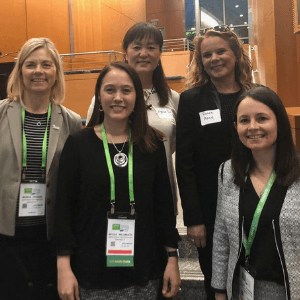 The American Association for Cancer Research (AACR) held its 2019 Annual Meeting, March 29 – April 3, 2019 in Atlanta. The AACR Annual Meeting provides an opportunity for the cancer community to come together and share the latest information on diagnostics, treatments, survivorship and public policy. The ABTA was present to learn about breaking brain cancer research, explore partnership opportunities and connect with researchers, including those supported by the ABTA’s Research Grant program. Read on to learn about emerging brain tumor research, and the scientists behind the latest advances.
The American Association for Cancer Research (AACR) held its 2019 Annual Meeting, March 29 – April 3, 2019 in Atlanta. The AACR Annual Meeting provides an opportunity for the cancer community to come together and share the latest information on diagnostics, treatments, survivorship and public policy. The ABTA was present to learn about breaking brain cancer research, explore partnership opportunities and connect with researchers, including those supported by the ABTA’s Research Grant program. Read on to learn about emerging brain tumor research, and the scientists behind the latest advances.
The Latest Brain Cancer Research
With our ears to the ground, the ABTA learned how scientists and clinicians are collaborating with physicists and computer scientists to develop new technology to improve patient assessment and diagnosis of brain tumors. We heard from experts on the newest forms of liquid biopsy, which may someday help to assess a patient’s blood or cerebral spinal fluid. This will help neuro-oncologists improve brain tumor diagnoses or monitor the effectiveness of a treatment.
Research into Tumor Treating Fields (TTF; also known as Optune) continues to expand. Current studies have shown TTF, an FDA-approved therapy for brain cancer, slow and reverse tumor growth by inhibiting mitosis (the process by which cells divide and replicate). Roger Stupp, MD of Northwestern University, discussed new studies that are using TTF to treat brain metastases and other types of cancer. Other researchers presented their latest laboratory findings that will help to better understand how TTF affect cancer cells, including ABTA grantee, Chirag Patel, MD of Stanford University. Understanding the ways TTF work to attack cancer will help oncologists to find ways to make them even more effective in the future.
ABTA-Supported Scientists Behind Brain Tumor Research
The ABTA is also dedicated to supporting talented researchers and scientists at the AACR Annual Meeting. One way the ABTA does this is by awarding travel scholarships to early-career brain tumor researchers who present their studies at the AACR meeting. At this year’s meeting, the ABTA supported six researchers, who were selected based on the exemplary merit of their research projects. ABTA Chief Mission Officer, Nicole Willmarth, PhD, and Director of Research and Grants, Heather Calderone, PhD, met these scholars and got to hear about their high-quality work. Two current ABTA research grantees, Eunhee Yi, PhD, and Fan Zhang, PhD, also presented their latest research findings.
As part of the AACR meeting, the ABTA research team also attended the annual Neuro-Tumor Club Meeting, organized by the Society for Neuro-Oncology. This meeting assembles brain tumor researchers in a more intimate setting to stimulate conversation and collaboration. At the meeting we engaged with and learned from ABTA Alumni Research Network members Renee Read, PhD, and Kyuson Yun, PhD, as well as ABTA Scientific Advisory Council member, Eric Holland, MD, PhD, among many other brain tumor experts.
AACR is an organization comprised of individuals from across the cancer community and around the world, including clinicians, researchers, pharmaceutical and device companies, patients, survivors and advocates. The ABTA is committed to highlighting the latest news to the brain tumor community coming from the AACR meeting.
Learn more about the ABTA’s Research program.
